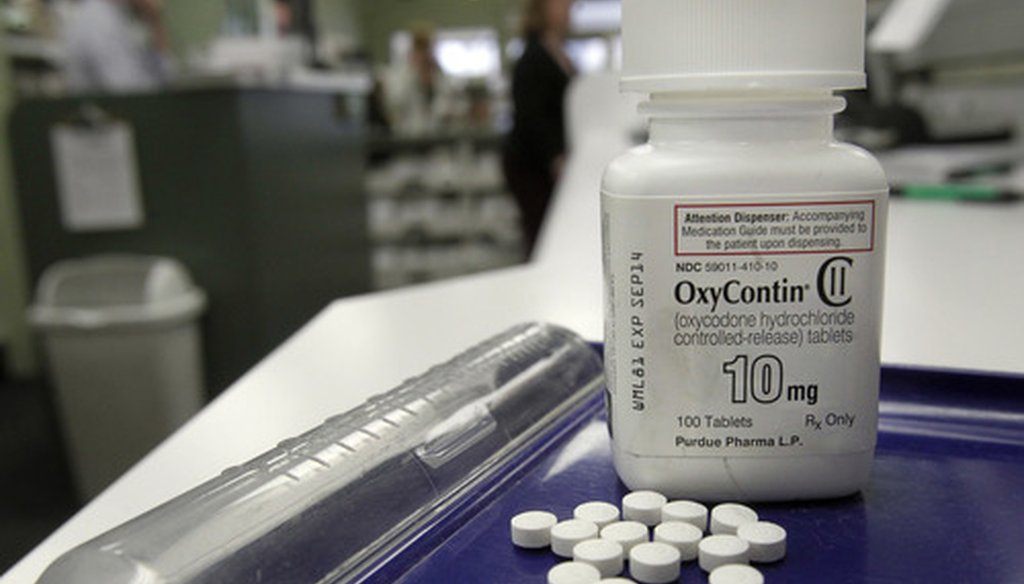

Our only agenda is to publish the truth so you can be an informed participant in democracy.
We need your help.


(Associated Press)
If there’s one issue many Democrats and Republicans agree on, it’s that prescription drug costs are too high. That point becomes particularly striking when U.S. costs are compared with drug prices in other developed nations.
But just how much more expensive are prescriptions here than elsewhere?
U.S. Rep. Gwen Moore, a Wisconsin Democrat, made this claim in a Dec. 11, 2019 tweet: "Prescription drug companies are charging Americans prices that are on average 4x higher than what's charged in other countries."
Does that comparison check out?
When asked for backup, Moore’s press secretary Samara Sheff pointed us to findings from the U.S. House’s Ways and Means Committee as well as an editorial from The Hill.
The committee compared drug prices in the U.S. with 11 countries using 79 drugs that were sold across 2017 and 2018.
The U.S. was compared alongside the United Kingdom, Japan, Canada, Australia, Portugal, France, the Netherlands, Germany, Denmark, Sweden and Switzerland. Individual drug prices in the U.S. ranged from 708% to 4,833% higher than the combined mean price of the other 11 countries measured. On average, U.S. drug costs were 3.7 times higher than the combined average of the other 11.
So that conclusion essentially matches Moore’s claim.
A 2017 report by the nonprofit Commonwealth Fund, which specializes in health care research, compared six top selling drugs between the U.S. and six other countries: Canada, the U.K., Germany, France, Australia and Norway.
The study examined Advair which is often used to treat asthma, Humira, commonly used for arthritis and Crestor, a cholesterol prescription.
On average, Advair was about four times higher in the U.S. than the compared countries. Humira was about twice as much and Crestor was also four times more.
In another study, conducted by the London-based International Federation of Health Plans, overall prescription drug costs were found to be about three times higher than the U.S. compared to the six countries of the U.K., United Arab Emirates, Germany, Switzerland, South Africa and the Netherlands.
Matthew Fiedler, a fellow with the USC-Brookings Schaeffer Initiative for Health Policy, says there can be difficulties in accurately measuring global drug price comparisons.
"The broad qualitative conclusion that drug prices are much higher in the United States than in other countries is surely correct," Fiedler said in an e-mail to PolitiFact Wisconsin. "But measuring drug prices — both in the US and abroad — is challenging because manufacturers often pay confidential rebates to purchasers."
Simon Haeder, assistant professor of public policy at Penn State University, said there are a few factors that make U.S. drug prices higher than other countries.
The primary reason cited by most scholars is a lack of competition in the U.S. For most medications, there is a lack of generic drug options available that could be cost efficient alternatives to more expensive brands.
Haeder argues that the path from the pharmaceutical company to the hands of the consumer is also full of middlemen who take a cut of profit of the drug, such as manufacturers, wholesalers and insurers.
"There’s a bunch of different entities that want to make money," Haeder said.
That ultimately drives up the cost of the drug once it is ready to be sold.
Additionally, the federal government does little compared to other countries when it comes to negotiating drug prices.
In a tweet, Moore said "Prescription drug companies are charging Americans prices that are on average 4x higher than what's charged in other countries."
We found studies that support this claim, though at least one pouts the gap somewhat smaller. Other factors, of course, include which drugs and which companies are included in the comparison.
Our definition of Mostly True is "the statement is accurate but needs clarification or additional information."
That fits here.
E-mail interview with Simon Haeder, assistant professor of public policy at Penn State University, on Feb. 13, 2020
E-mail exchange with Samara Sheff, press secretary for U.S. Rep. Gwen Moore, on Feb. 18, 2020
E-mail exchange with Matthew Fiedler, fellow, USC-Brookings Schaeffer Initiative for Health Policy, on Feb. 19, 2020
U.S. House of Representatives, Ways and Means Committee report: A Painful Pill to Swallow: U.S. vs. International Prescription Drug Prices, Sept. 2019
Commonwealth Fund, Paying for Prescription Drugs Around the World: Why is the U.S. an outlier? Oct. 5, 2017
The Hill, U.S. drug prices higher than in the rest of the world, here’s why, Jan. 19, 2018
DrugWatch, U.S. Drug Prices vs. the World, Jan. 25, 2018
In a world of wild talk and fake news, help us stand up for the facts.
